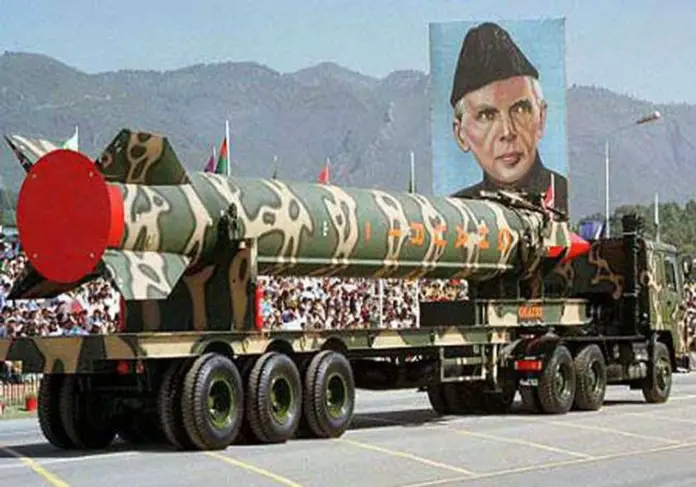Like every year, the nation is all set to celebrate the historical nuclear tests this Saturday in a befitting manner. The Pakistan Muslim League-Nawaz (PML-N) was in power when Pakistan became the world’s seventh and the first Muslim nuclear state after conducting its first nuclear test on May 28, 1998 in Chaghai, Balochistan. This year, the government has planned ten-day celebrations on the completion of 24 years of nuclear tests and the Ministry of Information and Broadcasting has released a national song aimed at highlighting the importance of “Youm-e-Takbeer”. This year theme of the day is “Na Jhuky thay na Jhuken gay” (Never bowed down, not will be).
The observance of Youm-e-Takbeer every year reminds us about the steadfast struggle of a nation towards building a stronger defence against hostile powers. Irrespective of regime change scenario, difference of opinion and international pressure, it was one of the rare goals achieved by Pakistan. Undoubtedly, May 28 is an unforgettable day in the history of Pakistan. Think for a moment, what would have been the status of Pakistan now, if it had not conducted the nuclear tests. Surely, it would have been a different scenario in view of deep seated grudge, hostilities and threats posed by arch rival India on different occasions towards Pakistan since 1947. Among them, Dhaka debacle was the worst tragedy that provoked a thought for building a more stronger shield for the country’s defence to fail the hegemonic and nefarious designs of the neighbouring state. India already had tested its first nuclear device in 1974 under its nuclear program named “Smiling Buddha”. This initiative by India gave momentum to Pakistan’s nuclear program and Dr. Abdul Qadeer Khan who was German trained metallurgist and nuclear physicist came to Pakistan and gave a boost to Pak nuclear programme. Dr. Abdul Qadeer Khan established Kahuta Research Laboratories in 1976 which worked under the supervision of Pakistan Atomic Energy Commission. So, the then prime minister Zulfiqar Ali Bhutto took the responsibility to carry on the programme and promised to arrange all necessary resources at any cost to make the nation’s defence invincible. Despite scanty resources, the programme was not abandoned by latter regimes and it culminated into a success on May 28, 1998 when the then prime minister Nawaz Sharif gave a go-ahead for the detonation of the nuclear device making the country’s defence impregnable despite huge international pressure especially from the US.
The success story owes a lot to the hard work done by Dr. Abdul Qadeer, who along with his team sweated over day and night to make it a reality. Dr. Qadeer had joined the nuclear programme after quitting a lucrative job in the Netherlands and made a lot of sacrifices towards the completion of this important assignment. The nation must acknowledge his services as well as all those persons, who made a contribution towards the achievement of this dream.
Every achievement is not possible without hard work, determination and consistency. The civilian and military leadership deserves appreciation for remaining steadfast faith in pursuance of the defence deterrence. Perhaps, it was the only issue where the building of consensus was not difficult as it involved the defence of the country from the hegemonic designs of the enemy. The continuation of the programme was not abandoned by successive military and civilian regimes and was taken to its logical end with a thumping success, which teaches us a lesson that the national interest should be kept supreme while tackling any challenge. Our leadership needs to build such consensus on other national issues as well like construction of big water reservoirs, economic challenges and political confrontation.
The invincible defence deterrence in fact has provided an opportunity to the government to work for the development of the country in a more secure environment. The prospect of a nuclear war is horrifying that has kept India away from indulging any adventurism. But Pakistan should not be complacent after achieving nuclear bomb technology. It still has a long journey. There is a lot of potential if the nuclear technology is used in a positive way. It can bring revolutionary changes in the energy, environment, health and industry sectors. There is a need to put the nuclear energy into work for the welfare of humanity. Currently, Pakistan has been facing one of the worst energy crises and if nuclear technology is put into proper use, it can ward off the crisis. Besides, its use in medical science can bring a revolution in healing many incurable diseases.
Lastly, the use of nuclear power should remain limited to using it as restraint against any hostile intentions. The start of a nuclear war between the two countries remains a dreadful dream not only for the masses of relevant states but also for the rest of the world. Because, a nuclear war can yield an unprecedented human death toll and habitat destruction. Detonating such a large amount of nuclear weaponry would have a long-term effect on the world’s climate that may generate significant upheaval in advanced civilisations. Nobody is oblivious of the terrible consequences of using nuclear weapons. Therefore, these weapons should never be used in any case.






